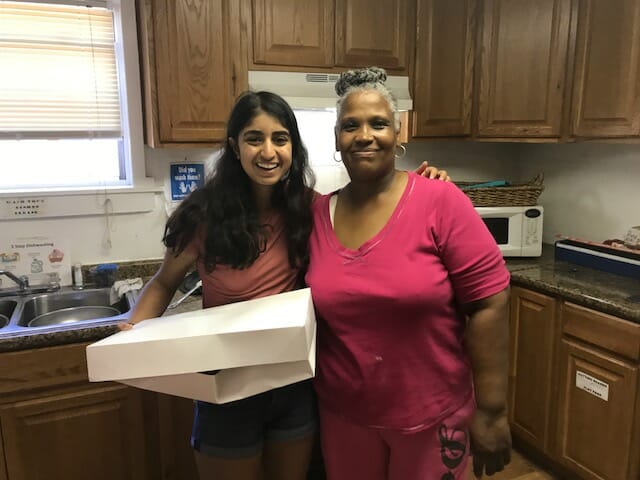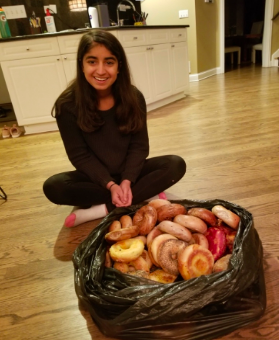Chicago Teen Fights Hunger, Builds Community in Hyde Park
Written By: Isaac Cannon Walker

Chicago’s Hyde Park neighborhood lies a few miles south of the central business district, nestled on the shores of Lake Michigan. It is home to the renowned University of Chicago and many Chicago landmarks, including Frank Lloyd Wright’s historic Robie House. At the same time, it is also home to many neighbors who aren’t always sure where their next meal will come from. According to the American Community Survey, close to 30 percent of children under age 11 in Hyde Park live in poverty. Across the county, one in seven people will experience food insecurity this year.
Riya Chadha, now a junior at the University of Chicago Lab School in Hyde Park, decided to take action. Last year, she launched the Food Surplus Project to reduce food waste and food insecurity by collecting excess food from her school cafeteria and donating it to local organizations serving food insecure Chicagoans. The project has found enthusiastic support from both the school and nearby shelters, and rescues nearly ten crates of food every week.
Riya Chadha is strengthening her community by connecting food that would otherwise be wasted with neighbors in need, and is today’s Daily Point of Light Award honoree. Points of Light spoke with Riya about her commitment to service.
This interview has been lightly edited for clarity.
What inspired you to start volunteering?
Essentially, the Food Surplus Project takes extra food from [our] cafeteria and takes it over to a shelter. I saw this type of operation work really, really well at different hospitals in my area – like the Rush University Hospital, the Palos Community Hospital – and I kind of loved how enthusiastic so many people were about this project. It brought a lot of cafeteria workers together, a lot of hospital workers, and it connected the hospital cafeteria to different shelters. That’s just something I loved, and something I felt would be amazing in my high school community. I go to the University of Chicago Lab School. It’s in Hyde Park, and it’s kind of known to be a private school that’s a bit disconnected from the community around it, so I felt this would be a good way to build bridges and definitely a good way to use some of the resources at Lab to make an impact in our community.

How has the community responded?
I have definitely felt that people have been really enthusiastic. I’ve made some amazing connections to people. One of my favorite memories is bringing over food, and giving the founder of the shelter I was donating to a giant hug and talking to her for a while.
Tell me a bit more about the food donation process.
It’s kind of a weekly thing. Every Tuesday morning, [a local reverend] takes a lot of different food that would originally be wasted at Lab cafeteria and brings it over to Door of Hope. There’s maybe 8-10 crates of food every week, and there’s a lot of different sandwiches and salads – just food of all kinds. Sometimes I load up the food myself, but if I’m a bit rushed with school then cafeteria workers, or other people involved with this project, take it outside and take it over to the reverend’s car and load it up there.
Were there any challenges in starting this project at your school?
Definitely. I had to pitch it to a lot of different administrators. I made a presentation about the information and what I hoped to do with the Food Surplus Project, and pitched it to administrators and people around the Lab community. I was met with a couple “no’s” at first, because people were a little bit nervous about what would come out of it, but, eventually, everybody came around and has become really excited about seeing this project through.
What has been the most rewarding part of your work?
One of the most rewarding things has been seeing how enthusiastic people at Lab are about this project. Seeing everybody super happy and eager to help out, coming together for a good cause, to help build bridges and connect with the community. Also, getting in touch with a lot of the people that we’re helping: talking to them for a bit and getting more insight into what we’re doing, how we’re helping.
I also started a club based around this project. It’s called the Food Surplus Club, and it kind of goes into the problem of food insecurity. It’s pretty cool, because we’re learning about some of the issues behind food insecurity, especially in the Chicagoland area. That’s definitely been pretty rewarding and has opened my eyes to problems people face. One thing we learned is that food insecurity is often a situational problem, and people get stuck in a situation because of different circumstances – medical bills, or [they lose] their job, or [there’s an] accident – and it’s hard for them to get the help that they need.
What is the Food Surplus Club’s format? Do you bring in guest speakers?
A lot of times it’s pretty discussion based. Occasionally we do some fundraisers, or host different events. Right now we’re trying to get a speaker in from the Greater Chicago Food Depository so we can learn about how a lot of the organizations that combat food insecurity operate.
What are your future plans for this project? Are there any upcoming programs or events that you’re particularly looking forward to?
Right now, we’re looking to expand the project to a lot of different cafeterias around Hyde Park. The school I go to is affiliated with the University of Chicago, so it would be amazing if we could get their school cafeterias on board. University of Chicago has a lot of different cafeterias, so [getting it on board] would be a pretty cool expansion of the project.
I’m definitely looking forward to the speaker event. Right now, it’s a consistent, ongoing thing that happens every week, and it’s pretty rewarding every week. But, if we can get it a little bigger and just help a few more people in the Chicagoland area, that would definitely be amazingly rewarding.
Why do you think that it’s important for others to give back?
Because it’s kind of an amazing feeling to get insight into somebody else’s perspective and learn about different circumstances that have affected them, and about different ways that we can help people out. Having empathy for other people and learning about their lives, and learning about the ways that they were affected by different out-of-control circumstances and ways that we can give back is something that’s incredibly rewarding for everybody.
Want to make a difference like Riya? Click here to find local volunteer opportunities.
